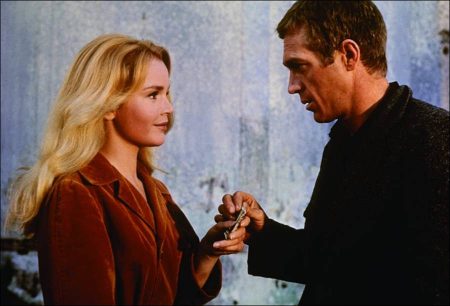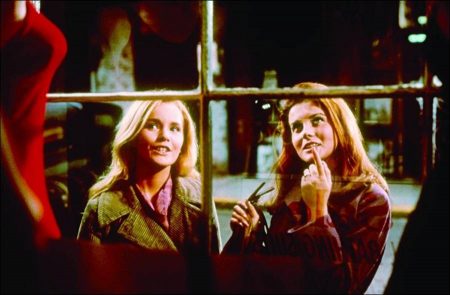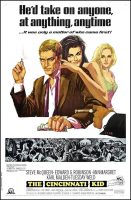The Cincinnati Kid movie storyline. In 1930’s New Orleans, Eric Stoner, better known as the Cincinnati Kid in the circles in which he travels, is an up and coming gambler, most specifically in back room games of stud poker. When the older Lancey Howard comes to town, he who is known as the best in the game, the Kid wants to play him and win so that his reputation will rise in gambling circles.
The Kid’s friend Shooter arranges the game easily as the Kid’s reputation precedes him. In the lead up to the game, the Kid faces numerous distractions including: Christian, his girlfriend who wants more of a commitment from him; Melba, Shooter’s sluttish wife, who lets it be known she is willing to cheat on Shooter just like she cheats on everything else in life; and the increasing betting odds against him in the big game.
The wealthy William Jefferson Slade tries to blackmail Shooter, the dealer, into rigging the game in the Kid’s favor solely to get back at Lancey. Problems may ensue for the Kid because of the attempted blackmail, regardless of if Shooter buckles under the pressure.
The Cincinnati Kid is a 1965 American drama film. It tells the story of Eric “The Kid” Stoner, a young Depression-era poker player, as he seeks to establish his reputation as the best. This quest leads him to challenge Lancey “The Man” Howard, an older player widely considered to be the best, culminating in a climactic final poker hand between the two.
The script, adapted from Richard Jessup’s novel, was written by Ring Lardner Jr. and Terry Southern; it was Lardner’s first major studio work since his 1947 blacklisting as one of The Hollywood Ten. The film was directed by Norman Jewison and stars Steve McQueen in the title role and Edward G. Robinson as Howard. Jewison, who replaced original director Sam Peckinpah shortly after filming began, describes The Cincinnati Kid as his “ugly duckling” film. He considers it the film that allowed him to transition from the lighter comedic films he had previously been making and take on more serious films and subjects. The film garnered mixed reviews from critics on its initial release; supporting actors Robinson and Joan Blondell earned award nominations for their performances.
About the Story
In the 1930s Eric Stoner, nicknamed “The Kid”, is an up-and-coming poker player in New Orleans. He hears that Lancey Howard, a longtime master of the game nicknamed “The Man”, is in town, and sees it as his chance to finally become the Man himself. The Kid’s friend Shooter cautions him, reminding the Kid how Shooter thought he was the best five-card stud player in the world, until Howard “gutted” him when they played.
Howard arranges a game with wealthy William Jefferson Slade, who secures Shooter’s services as dealer. Howard wins $6,000 from Slade over a 30-hour game, angering Slade and wounding his pride. That night at Slade’s home, he tries to bribe Shooter into cheating in the Kid’s favor when the two players meet. Shooter declines, but Slade calls in Shooter’s markers worth $12,000, and blackmails him by threatening to reveal damaging information about Shooter’s wild wife, Melba. Shooter agonizes over his decision, having spent the last 25 years building a reputation for integrity.
With the Kid’s girl Christian visiting her parents, Melba tries to seduce him, even though she and Christian are close friends. Out of respect for Shooter, he rebuffs her, and spends the day before the game with Christian at her family’s farm.
The Kid intentionally arrives late to the game. The big game starts with six players, including Howard and the Kid, with Shooter playing as he deals and Lady Fingers relieving him whenever Shooter needs a break. In the first big confrontation between the Kid and Howard, the Kid is short $2,000 and Slade steps in to stake him. Several hours later, Howard busts a player called Pig, perhaps with a bluff, and the remaining players take a break. Following the break, Lady Fingers, who has been delighting in needling Howard all evening, takes over as dealer and continues to needle him.
As the game wears on, Shooter only deals, and then after another hand when Howard outplays them, two more players, Yeller and Sokal, drop out. That leaves just Howard and the Kid. After a few unlikely wins, the Kid calls for a break and confronts Shooter, who admits to being forced into cheating by Slade. The Kid insists he can win on his own and tells Shooter to deal straight or he will blow the whistle, destroying Shooter’s reputation. Before the game resumes, Melba succeeds in seducing the Kid. Christian makes a surprise visit to the room, catches them after the fact and walks out on the Kid.
Slade tells the Kid that Shooter will continue to cheat for him and confronts him with a menacing thug, but the Kid flatly refuses. Back at the game, the Kid maneuvers to have Shooter replaced by Lady Fingers, lying that Shooter is ill. He then wins several major pots from Howard, who is visibly losing confidence.
During the final hand Howard beats the Kid with a queen-high straight flush. The Kid turns over his cards to show he has a full house, aces full of tens. This loss devastates the Kid, who not only loses all his money in this final hand, but also an additional $5,000 raise from Howard which the Kid called before Howard showed his hand. Howard then mocks the Kid, telling him that he will always be “second best” as long as Howard is around. As the Kid leaves the table, he is ridiculed by both Slade and Melba, and consoled by Shooter.
The Cincinnati Kid (1965)
Directed by: Norman Jewison
Starring: Steve McQueen, Edward G. Robinson, Ann-Margret, Karl Malden, Tuesday Weld, Joan Blondell, Jack Weston, Theodore Marcuse, Milton Selzer, Émile Genest, Karl Swenson, Irene Tedrow
Screenplay by: Ring Lardner Jr., Terry Southern
Cinematography by: Philip H. Lathrop
Film Editing by: Hal Ashby
Costume Design by: Donfeld
Set Decoration by: Henry Grace, Hugh Hunt
Art Direction by: Edward C. Carfagno, George W. Davis
Music by: Lalo Schifrin
MPAA Rating: None.
Distributed by: Metro-Goldwyn-Mayer
Release Date: October 27, 1965 (Nationwide)
Visits: 152


